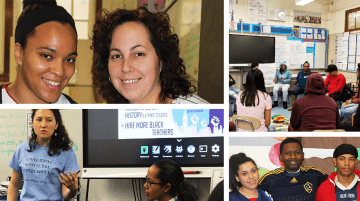This case study of Bronxdale High School in New York City provides an in-depth look at how a successful school serving diverse learners organizes its structures and practices consistent with knowledge rooted in the sciences of learning and development. The school is one of five small high schools co-located in an imposing five-story building in the northeast section of the Bronx. Although most of its 445 students enter Bronxdale performing well below proficiency levels on standardized tests, they outperform their peers in credit accrual, 4- and 6-year graduation rates, and enrollment in postsecondary education.
Bronxdale aims to create a safe, caring, and collaborative community in which staff, students, and families have voice, agency, and responsibility. This vision sets the foundation for the school’s mission: to develop students as “self-reliant, independent learners who are curious and know how to be thinkers” and are “creative problem-solvers.”
Bronxdale aims to create a safe, caring, collaborative community in which staff, students, and families have voice, agency, and responsibility.
Bronxdale’s vision, which drives organizational and programmatic decisions and choices, is informed by a deep understanding of how systemic social injustice has affected its students and their academic and life opportunities. Students have access to academic assistance, as well as physical and mental health services as part of the school’s system of supports; teachers engage in ongoing professional learning that is responsive to students’ needs; and classroom norms are co-created by students, who also share responsibility for ensuring they are followed.
According to Principal Carolyn Quintana, the goal at Bronxdale High School is to “teach the way our students learn best.” Using an inquiry-based approach to learning, Bronxdale staff are dedicated to fostering a realistic, relevant, and hands-on educational experience for all students. Teachers emphasize community building, including developing trusting relationships with students and establishing an environment of belonging and safety. These efforts are essential, according to Principal Quintana, who noted that the school’s inquiry-based approach “can’t happen without taking care of students’ social-emotional needs.”
The factors that distinguish Bronxdale are grounded in the science of learning and development, which has emerged from neuroscience, cognitive science, and the developmental sciences over the last several decades. This science supports four principles for educational practice:
- A positive school environment that supports student success along the developmental continuum. Features include school structures and classroom practices that support positive, trusting relationships; attachment and emotional connections; physical and emotional safety, including identity safety; and a sense of belonging and purpose.
- Support for the intentional development of social, emotional, and cognitive skills, mindsets, and habits. These skills include self-regulation, executive function, intrapersonal awareness, and interpersonal skills, as well as a growth mindset and a sense of agency that support resilience and productive action. Supports for behavior should be educative and restorative, enabling students to learn how to collaborate, resolve conflicts, and contribute to the community.
- Curricular designs and instructional strategies that support academic capacity, competence, efficacy, motivation, and metacognitive skills. These designs feature well-scaffolded instruction and ongoing formative assessment that support personalized and collaborative learning, take students’ prior knowledge and experiences into account, and provide the right amount of challenge and support on relevant and engaging learning tasks.
- Multi-tiered systems of support based on a shared developmental framework. These systems provide personalized academic and nonacademic supports that seek to remove obstacles to learning and address the effects of adversity.
The principal’s role has been central to shaping and realizing Bronxdale’s vision for community, which relies on the adults in the school having built an interrelated set of beliefs and dispositions. These include an active interest in knowing students well and providing the academic, social, and emotional supports they need. Teachers see these relational connections with students as integral to their teaching and essential to achieving the school’s vision. That vision has helped Bronxdale High School evolve into a caring, safe, inquiry-based school community, committed to the success of its diverse students.
Teaching the Way Students Learn Best: Lessons from Bronxdale High School by Jacqueline Ancess, Bethany L. Rogers, DeAnna Duncan Grand, and Linda Darling-Hammond is licensed under a Creative Commons Attribution-NonCommercial 4.0 International License.
This research was supported by the Chan-Zuckerberg Initiative and by core operating support provided by the Ford Foundation, the William and Flora Hewlett Foundation, and the Sandler Foundation. We are grateful to them for their generous support. The ideas voiced here are those of the authors and not those of our funders.
Cover photos used with permission by Bronxdale High School.
